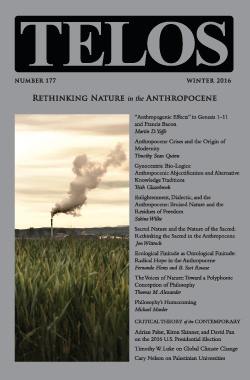Recent initiatives to utilize household and personal mobile technologies to further specific security, surveillance, and counter-terrorism objectives pose significant challenges to civil liberties and personal well-being. The social and political statuses of these technological systems are just emerging: they are rapidly being infused into home settings and mobile devices, apparently under the control of users but under at least the partial monitoring and operation of various governmental and corporate entities. Individuals are being increasingly surveilled by sets of security-related mechanisms in their home automation and mobile communications devices as well as by other manifestations of the “Internet of Things” (IoT).
|
The vulnerability we confront in the Anthropocene is what Jonathan Lear has called ontological vulnerability: the possible collapse of our world, that is, the collapse of the taken-for-granted way of life that guides and orients us in our everyday practices. In this paper, we take up Lear’s claim that in the face of the impending collapse of one’s world, a peculiar form of hope, radical hope, is called for. According Lear, radical hope means holding on to a “commitment only to the bare possibility that, from this disaster something good will emerge.” Writing at the Claremont Review of Books, Aaron Zack reviews the new English translation of Carl Schmitt’s Land and Sea, now available from Telos Press. Purchase your copy in our online store and save 20% by using the coupon code BOOKS20.
Telos 177 (Winter 2016) is now available for purchase in our store. “If, in addition, one imagines not only that airplanes fly through the airspace over land and sea but also that radio waves from transmissions from all lands circle the globe uninterruptedly through the atmospheric space, then it would be easy to believe now not only that a new, third dimension has been achieved but also that even a third element has been added, the air, as a new elementary domain of human existence. To both the mythic beasts, Leviathan and Behemoth, a third would be added, a great bird. But we must not be overhasty with such consequential propositions. Indeed, if one thinks of the mechanized technical means and energies with which human power is exercised in airspace, and if one recognizes the explosive motors by means of which air machines are moved, then it appears that it is the fire that is the additional, genuinely new element of human activity.” The aftermath of the War on Terror rages on despite bipartisan assurances that “major combat operations are over” and that “the war is coming to a close.” This ongoing conflict has produced, and continues to produce, prodigious human casualties and economic hemorrhaging. Tim Luke’s words regarding September 11, 2001, are in many ways as timely today as they were nearly fourteen years ago. |
||||
|
Telos Press Publishing · PO Box 811 · Candor, NY 13743 · Phone: 212-228-6479 Privacy Policy · Data Protection Copyright © 2024 Telos Press Publishing · All Rights Reserved |
||||








